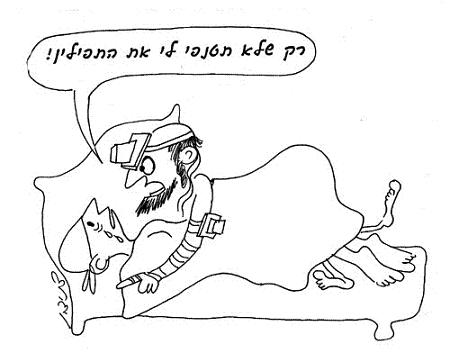
On the holiday of Sukkot one is obligated to sleep in the sukkah and is forbidden to sleep outside of it. The prohibition on sleeping outside of the sukkah is for regular sleep, but casual short naps are permitted according to the letter of the law; the early sages also forbade naps. The scholars explained the ruling by the early sages: One is forbidden to doze off for a short nap lest one fall into a deeper sleep and thereby sleep outside the sukkah. One of the scholars, Abaye, asked: If we fear that one will fall from a nap into a deep sleep, why did the early sages allow one to nap with tefillin on his head, though one is forbidden to sleep with tefillin on, lest he expel gas during his sleep? Answer: The sages permitted one to sleep with tefillin on when another person is charged with waking one up. The scholars continued to ask: Perhaps the guard will also fall asleep? “The guard also needs a guard.” A different scholar, Rabbi Yochanan, answered: One may take a nap wearing tefillin if one puts one’s head between one’s knees, so there is no fear he will fall into a deeper sleep. Another scholar, Rava, answered: There is no difference between a nap and sleep because there is no defined time for either; sometimes a short nap is as useful as a long sleep. This is the reason one is forbidden to sleep outside of the sukkah or even nap. But one is forbidden to sleep with tefillin on his head not because of the length of the nap but because of the fear that he will expel gas, and there is no such fear during a nap. The scholars clarified the length of a nap; one said that it lasts 50 seconds, “the time it takes to walk 100 amah.” The sages also said that a person who wishes to sleep in the middle of the day need not remove his tefillin, for people do not customarily fall deeply asleep during the day and there is no fear that he will have conjugal relations with his wife; at night he must remove his tefillin lest he have conjugal relations with his wife and fall deeply asleep and then expel gas. A different sage, Rabbi Yossi, said that if the man is newly married and his desire strong, he must also remove his tefillin during the day, lest he have conjugal relations with his wife while still wearing tefillin. The scholars also said that if a person forgot and had conjugal relations with his wife while wearing tefillin, he should not remove them until he has washed his hands, for during sex “the hands are busy” and it is inappropriate to touch the tefillin straps with soiled hands.
(Babylonian Talmud, Tractate Sukkah 26a-b)
